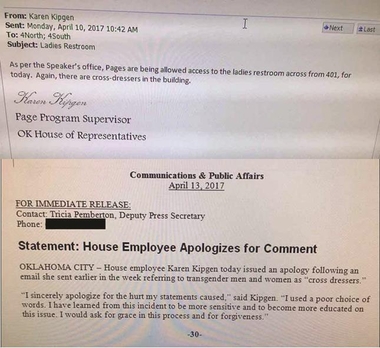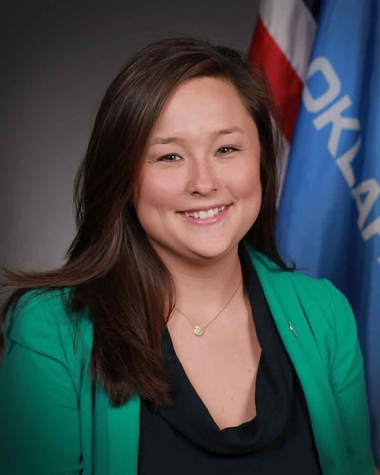Are you welcome at your state Capitol?

by Rob Howard
Associate Editor
April 10 was a busy day at Oklahoma’s State Capitol building. It was HIV Awareness Day, as well as a lobbying day for many groups, including school students lobbying for improved school funding. One group was led by Toby Jenkins, Executive Director of Oklahomans for Equality (OkEq).
“We arrive and we have several transgender and gender non-conforming kids in our group,” said Jenkins. “They’ve been visiting legislators and using the bathroom they are comfortable with.”
And then, against the backdrop of a Capitol full of LGBTQ people and allies, an email by Karen Kipgen, Page Program Supervisor for the House, stirred up a storm. It said, “As per the Speaker’s office, Pages are being allowed access to the ladies restroom across from 401, for today. Again, there are cross-dressers in the building.”
Jenkins responded, “They used the term ‘there are cross-dressers in the building.’ That’s a term of derision and bigots, not the language that educated informed people use. That is insulting and shameful.” He led his student group to House Speaker Charles McCall’s office.
The Speaker, who had not heard about the email until the student group confronted him, issued a statement saying, “The email was not authorized by me, my staff or my office. It was sent unilaterally by a House staff member without any input or permission. I was unaware that such an email was being sent, and the remarks contained in the email are not condoned by me or the Office of the Speaker. As Speaker, all Oklahomans should feel welcome in the Oklahoma Capitol building.”
Ms. Kipgen later apologized in a statement, saying, “I sincerely apologize for the hurt my statements caused. I used a poor choice of words. I have learned from this incident to be more sensitive and to become more educated on this issue. I would ask for grace in this process and for forgiveness.”
It appears to run deeper than a “poor choice of words” though. Troy Stevenson, Executive Director of Freedom Oklahoma, said, “[This is] not the first instance of a marginalized community being discriminated against at the Capitol.”
Rep. John Bennett, who has called Islam “a cancer,” has a list of questions for Muslims to answer before he meets with them. Council on American-Islamic Relations of Oklahoma Executive Director Adam Soltani called the questions, “stupid, Islamophobic, hateful [and] bigoted.”
In April, a group from the Federation of the Blind of Oklahoma was at the legislature to lobby against bills that they say would be damaging to blind people and their businesses. In hearings, the blind constituents were neither recognized nor given an opportunity to make comments to the committee.
The Federation, in a resolution, condemned the Legislature for demonstrating a pattern of disrespect and disregard for the blind.
The Oklahoma Legislature is not alone in discriminating against marginalized communities. Other states in The Gayly’s region also seem to focus on minority groups, especially LGBTQ people.
In Arkansas, the 2017 legislature considered bills to restrict transgender bathroom use; make it impossible for transgender people to get the gender on their birth certificate changed; and refused to allow both same-sex parents to be listed on their child’s birth certificate.
In Kansas, during a hearing on a bill in 2005, an opponent said, “homosexuals want … government validation of their sins and to intimidate employers, landlords and the populace.”
In Missouri, several bills were introduced that would discriminate against transgender people. And in Texas, Lt. Gov. Dan Patrick, long an opponent of LGBTQ rights, continues efforts to prevent transgender people from using bathrooms that conform to their gender identity.
To be fair, not all legislators practice bigotry against LGBTQ people. The Houston Chronicle reported that more than a dozen senators, probably a majority of the House, have reservations about the need for a bathroom bill.
In Oklahoma, “There are both Democratic and Republican members that are just as upset as we are,” said Stevenson about the cross-dresser email. “It’s a deeper problem than just one email. It’s about not having been trained on how to speak to or about minority populations. I think it’s very much a teachable moment.”
Some legislators agree with that assessment. Rep. Emily Virgin (D-Norman) said House members and staffers need, “Some kind of training or course on how to make all Oklahomans feel welcome in their state Capitol.”

Rep. Cyndi Munson (D-Oklahoma City) said, “I want every student who came to the Capitol to know three things: You are loved, accepted, and you are always welcome to your State Capitol.”
More sensitivity and diversity training is needed for lawmakers and their staff in this deep red region. Other states’ advocates for minority groups, including LGBTQ advocates, will no doubt continue efforts to help lawmakers better understand their communities, and the needs of those communities.
Copyright 2017 The Gayly – May 8, 2017 @ 11:05 a.m.





